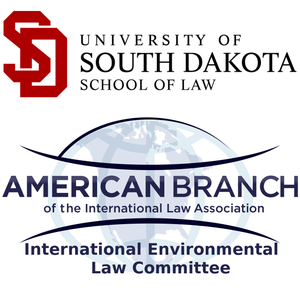
The Global Energy & Environmental Law Podcast
The International Environmental Law Committee of the American Branch of the International Law Association
A discussion of global and local energy and environmental law issues.
- 29 minutes 16 secondsEducating girls in Africa using carbon offsets
Myanna Dellinger interviews Guðný Nielsen who explains how her organization, SoGreen, uses carbon offsets for the education of girls in Africa and how that, in turn, helps reduce climate change.
SoGreen is an Icelandic Climate Tech startup based out of her hometown Reykjavik, Iceland. SoGreen focuses on scaling up climate solutions that are founded in social impact and community development in low-income countries.
29 August 2022, 3:51 pm - 49 minutes 29 secondsClimate Change Governance
While the U.S. and other national governance systems are arguably not taking sufficient and certainly not sufficiently urgent action against climate change, other inroads may work better. Further, new behavioral science shows new ways of persuading both corporations and individuals to think and act in better ways in relation to climate change. In this episode, EinStrong law and policy director Myanna Dellinger, Esq., will talk with Dr. Kristian S Nielsen of Cambridge University about private and public climate governance for climate change mitigation in the U.S. and beyond.
Dr. Kristian S Nielsen is a postdoctoral research associate at the Department of Psychology, University of Cambridge. Kristian received a PhD from Copenhagen Business School in 2019 with a dissertation examining the role of self-regulation in environmental behavior change. Kristian's current research focuses on behavior change in the context of climate change mitigation, biodiversity conservation, and sustainable clothing consumption.
Special thanks to David Dellinger for recording and editing this podcast.
12 August 2022, 3:01 pm - 40 minutes 20 secondsThe Amazon is burning – is Paris too?
Professor Myanna Dellinger interviews law professor and Brazilian attorney Dr. Carolina Arlota of the University of Oklahoma College of Law, who compares climate change action in Brazil to that in the United States. Among other things, she promotes the view that litigation may help advance the agenda even if positive outcomes are not achieved at the judicial scale because of, among other things, the “poltical question doctrine.” Professor Arlota also discusses the Brazilian Constitution, which promotes environmental protection.
This interview is based on Dr. Arlota’s article "The Amazon Is Burning—Is Paris, Too? A Comparative Analysis Between The United States And Brazil Based On The Paris Agreement On Climate Change" published in the Georgetown Journal of International Law, Vol. 52, 2020.
The findings demonstrate that, given the silence of the U.S. Constitution on environmental matters and the decades-long congressional inertia on climate issues, an effective way to update the U.S. constitutional text will be through judicial review. As the comparative analysis unveiled in this article shows, standing is a major barrier to judicial review on climate change claims. Accordingly, this article includes a recommendation for the flexibilization of the traditional standing requirements for the United States to achieve effective environmental protection and related mitigation of greenhouse gas (GHG) emissions.
4 October 2021, 3:53 pm - 32 minutes 27 secondsLisa Bloom on Veganism
Lisa Bloom, Esq. is widely known for her tireless work for ordinary people seeking justice, especially victims of sexual harassment, domestic violence, LGBTQ discrimination, racial bias, sexual assault, and excessive police force. She and her team have won many verdicts and settlements against high profile people accused of misconduct, including sex offender Bill Cosby, serial sexual harasser Bill O’Reilly, Guess CEO Paul Marciano and billionaire Alki David. In this episode, she is talking about another passion of hers: veganism. Hear her passion shine through for animals, the health and wellbeing of people around the world, and recommendations for how you too can relatively effortlessly become a vegan or at least start your route towards this goal.
6 March 2021, 8:45 pm - 36 minutes 29 secondsThe Keystone Pipeline System: An Exercise in Futility
Hear law professors Sean Kammer (PhD) and Myanna Dellinger (PhD candidate) discuss why the corporate and conservative attempts at keeping the Keystone XL Pipeline and the Dakota Access Pipeline will inevitably fail and why, then, it would be more expedient from an environmental and business point of view to face reality sooner rather than later. This holds true despite the fact that any president does have the power to issue an Executive Order regarding the project.
Under the Paris Agreement, we must, among other things, reach net zero emissions by 2050 to help the world – and ourselves – limit catastrophic climate change. UN and other experts have made it clear that we must take sufficient action within the next decade. For that reason, it also makes not sense to create and continue vast oil distribution networks.
8 February 2021, 4:57 pm - 22 minutes 49 secondsFossil Fuel Industry Gaslighting People of Color
The fossil fuel industry is not accepting its inevitable fate: that it has to go. While that is understandable from a purely capitalist business perspective, industry attempts to hang on for dear life by, for example, trying to persuade people of color and low-income people that natural gas is beneficial and “clean” would be laughable if they weren’t as scheming and focused on profits over the health of the planet as they are. Beware of industry tactics! Learn more here.
30 December 2020, 10:05 pm - 29 minutes 13 secondsThe Green Amendment - Securing our right to a healthy environment
Attorney and activist Maya van Rossum, author of The Green Amendment: Securing Our Right to a Healthy Environment discusses a pioneering new legal strategy to fight growing pollution problems, including drinking water contamination, air pollution, deforestation and climate change, by adopting constitutional green amendments that guarantee a safe and healthy environment.
Van Rossum is also the leader of the Delaware Riverkeeper Network, an organization that has successfully stalled fracking and pipeline development in the Northeast. The DRN initiated For the Generations, a project that provides a guide to creating an environmental rights amendment in every US state.
This veteran environmentalist used the constitution in Pennsylvania to take on and beat big fossil fuel industries, and how these amendments could change the legal landscape to crises such as Flint, Keystone, ad beyond.
Van Rossum believes that environmental rights are a fundamental human right, just like free speech and the right to private property.12 February 2018, 6:59 am - 29 minutes 42 secondsSustainability and Governance - Taking Steps for the Future
Professor Myanna Dellinger interviews Christine Harada, the former Federal Chief Sustainability Officer under the Obama Administration. Ms. Harada is currently working with the XPRIZE Foundation as a Bold Innovator, developing the next XPRIZE for Clean Air. Christine is also a Senior Fellow with the Los Angeles CleanTech Incubator, where she helps build out the cleantech economy in Los Angeles, CA.
Christine explains what her duties were under the Obama Administration, and how those duties are (hopefully) being carried out under the Trump Administration.
This episode was recorded at Occidental College in Los Angeles.
10 August 2017, 3:52 am - 31 minutes 17 secondsRegenerative Agriculture
In this epispode, Professor Myanna Dellinger interviews David R. Montgomery, a MacArthur Fellow and professor of geomorphology at the University of Washington. He is author of The Hidden Half of Nature and Dirt: The Erosion of Civilizations, as well as other award-winning popular science books. He lives in Seattle with his wife, author and biologist Anne Biklé, and Loki, their guide-dog dropout.
What if there was a relatively simple, cost-effective way to help feed the world, reduce pollution, pull carbon from the atmosphere, protect biodiversity, and make farmers money to boot? Through fieldwork spanning three decades and six continents, renowned geologist David R. Montgomery discovers that the answer is right beneath our feet. GROWING A REVOLUTION: Bringing Our Soil Back to Life [W. W. Norton & Company; May 9, 2017] is a spellbinding journey to uncover the blueprint for a regenerative agriculture that builds soil health and leaves both farmers and the environment better off. It is a book that Kirkus Reviews states is, “An optimistic look at how regenerate farming can revive the world’s soil, increasing food production, boosting cost effectiveness, and slowing climate change.”
In his quest to reveal the solutions beneath our feet, Montgomery introduces us to innovative farmers who practice regenerative agriculture. Montgomery shows that restoring fertility to the land is not an either-or choice between modern technology and time-tested traditions. Ending with a call for action beyond the fields, Growing a Revolution is an inspiring addition to the bookshelf of anyone seriously concerned with the future of food and farming, our relationship with nature, and the fate of civilization and the planet.
12 June 2017, 12:49 am - 25 minutes 57 secondsThe Logic and Controversies of Geoengineering
In this podcast hosted by Professor Myanna Dellinger, Dr. Stefan Schäfer presents his view on the pros and cons of the ever-controversial, but, in his view, also promising aspects of climate geoengineering.
Dr. Stefan Schäfer is a political scientist interested in the history, philosophy and politics of science and technology. He leads a research group on climate engineering at the Institute for Advanced Sustainability Studies (IASS) in Potsdam and is Oxford Martin Visiting Fellow at the Institute for Science, Innovation and Society, University of Oxford. He was a guest researcher at the Berlin Social Science Center (WZB) from 2009-2012 and a fellow of the Robert Bosch Foundation’s Global Governance Futures program in 2014-2015. He is a contributing author to the Fifth Assessment Report of the Intergovernmental Panel on Climate Change, lead author of the European Transdisciplinary Assessment of Climate Engineering (EuTRACE) report, and chair of the Steering Committee of the Climate Engineering Conference (CEC) series. He holds a doctorate in political science from Freie Universität Berlin. See his profile at http://www.iass-potsdam.de/en/people/stefan-schaefer.
18 May 2017, 4:43 am - 38 minutes 46 secondsSuper Smart Energy Grids
In this podcast, Professor Myanna Dellinger interviews Dr. Armin Haas on how smart energy grids could solve some of the issues surrounding sustainable energy.
Armin Haas is a senior researcher in the Systemic Risk project of the Institute for Advanced Sustainability Studies, Potsdam (IASS), and leads the IASS activities within the EU Horizon 2020 projects Dolfins and Green-Win. Moreover, he leads the research line Integrated Risk Governance of the Global Climate Forum (GCF). At IASS his main research foci concern the economic, ecological and social sustainability of the financial system, and innovative contributions to the management and governance of systemic risks. At GCF, his research focuses on innovative approaches for the management of large-scale complex uncertainties. He holds a Ph.D. in economics from the University of Karlsruhe, Germany. Before joining IASS, he worked as senior scientist at the Potsdam Institute for Climate Impact Research (PIK) and headed the research group Bayesian Risk Management. Together with colleagues from PIK and IIASA, he conceived the SuperSmart Grid.
30 March 2017, 3:45 pm - More Episodes? Get the App
Your feedback is valuable to us. Should you encounter any bugs, glitches, lack of functionality or other problems, please email us on [email protected] or join Moon.FM Telegram Group where you can talk directly to the dev team who are happy to answer any queries.
 The Daily
The Daily